In 1844 Andrew Bent cobbled together a retrospective of his career for his pamphlet appealing for charitable aid. He stated
… he is recognized by All, who know anything of the past history of these Colonies, as “The Father of the Press;” and has been honored with the designation of the “Tasmanian Franklin.”
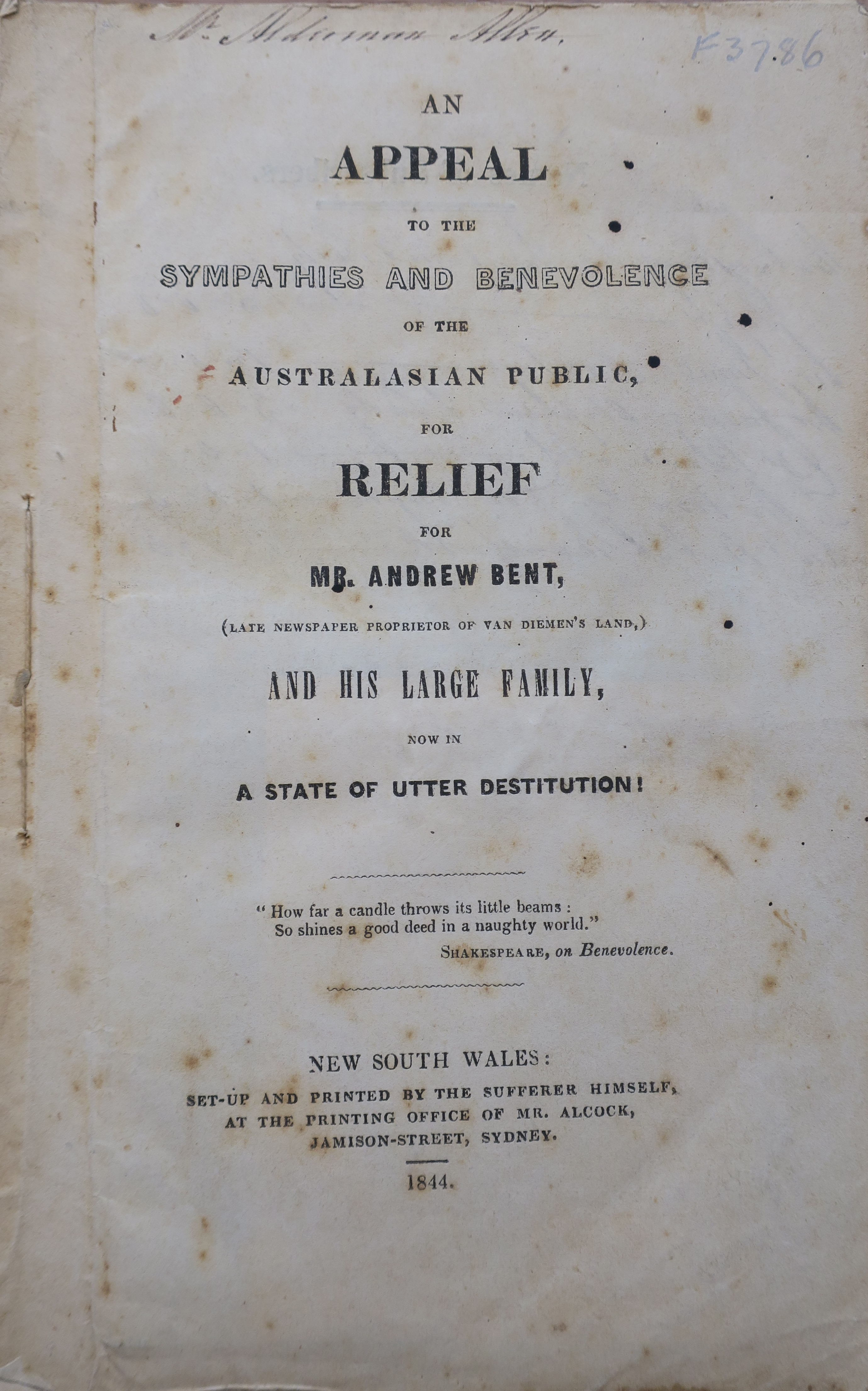
Bent’s promotion of himself to the public, and to his family, as the ‘Father of the Tasmanian Press’ conveniently overlooks the claims of Tasmania’s very first printers, notably George Clark. But given the scale of his contribution to Tasmania’s early print culture, particularly between 1815 and 1830, he is probably the most entitled of all Tasmania’s early printers or newspapermen to wear that mantle, even if it was a self-styled one.
The designation ‘Tasmanian Franklin’ is another kettle of fish entirely. Bent did not coin the phrase himself. It was bestowed upon him by the editor of the Sydney Monitor, Edward Smith Hall. It was obviously intended as praise for Bent’s stand for press freedom, but to Bent’s contemporaries the placing of a working class cockney (and an ex-burglar to boot) on a pedestal with one of the leading intellectuals of the eighteenth century might have appeared quite incongruous. Leaving aside Bent’s clutching at straws towards the end of his life, we can only speculate whether the moniker tickled his fancy and stroked his ego at the time it was first applied, but it might have been better for him if the comparison had never been made.
BENJAMIN FRANKLIN (1706-1790)
Benjamin Franklin needs little introduction. He is a towering figure in the history of the United States, a drafter of the Declaration of Independence and a signatory to it, to the Constitution and other founding documents. Besides being famous as a statesman, Franklin is renowned as a scientist, inventor, philosopher, writer, and champion of free speech. As it happened, he was also a trained, hands-on printer, who learned to get his hands dirty at both press and case. He became an important publisher and conducted one of America’s most significant early newspapers.

Freedom of speech is a principal pillar of a free government; when this support is taken away, the constitution of a free society is dissolved, and tyranny is erected on its ruins. (Pennsylvania Gazette November 1737).
Franklin’s printing career commenced with a brief period in Boston apprenticed to his older brother James. James Franklin (1697–1735) had established the second print shop in the American colonies, and was one of the first American pressmen to be gaoled for political remarks in his newspaper, the New England Courant. There are some similarities with Andrew Bent here, for James Franklin was a craftsman newspaper printer who suffered for the writings of his gentlemen contributors. Hall’s comments, however, clearly refer to his more famous brother.
Benjamin Franklin received further printing training in London over eighteenth months in 1724-5, noting in his autobiography the heavy drinking habits of the London printers. Back in the Americas, in 1729 he became co-owner of the Pennsylvania Gazette and developed it into an important and successful newspaper.

One of Franklin’s maxims, often quoted and reputedly displayed in many a print shop, was that
Printers are educated in the belief that when men differ in opinion, both sides ought equally to have the advantage of being heard by the public, and that when Truth and Error have fair play, the former is always an overmatch for the latter.
A similar motto—Open to all parties, influenced by none—appeared on the Public Ledger newspaper at Bent’s old workplace in London and was re-used for the Colonial Times in Hobart.
An amusing epitaph Franklin wrote for himself (but which never appeared on his tombstone) was often quoted too. It even appeared, copied from an overseas publication, as an early filler in Bent’s Hobart Town Gazette in 1820—Franklin’s first appearance there.
EDWARD SMITH HALL (1786–1860)
The Australian Media Hall of Fame describes Hall as ‘one of Australia’s first and most vigorous fighters for press freedom and social justice.’

Hall was not a trained printer, but became a newspaper proprietor and editor some fifteen years after arriving in New South Wales. His Monitor (later renamed the Sydney Monitor) was the second independent paper in Sydney. It commenced on 19 May 1826, the single unblinking eye in the masthead warning that nothing would escape its vigilant scrutiny.

Hall supported a representative assembly and trial by jury, issues that were also strongly canvassed in Bent’s papers, declaring that ‘Packed Juries, and Magisterial Juries on Magisterial questions, and Taxation without Representation, cannot long exist in the burning radiance of a free and virtuous press’. Hall became a trenchant critic of Governor Ralph Darling, and in 1829 was gaoled for fifteen months for seditious libel on the Governor, and a criminal libel on a public official. He continued writing from Parramatta gaol, and was sentenced to further prison terms for comments in his newspaper.
Hall and Bent never met in person, although they appear to have corresponded. They were certainly kindred spirits and during Bent’s struggles in 1827 Hall provided considerable moral support. He had strongly opposed the proposals to introduce restrictions on newspapers in New South Wales and roundly condemned the Newspaper Acts passed later in the year in Hobart as ‘dreadful attacks’ on freedom. He suggested the Tasmanian colonists should petition for the removal of those responsible (Lieutenant Governor Arthur and Chief Justice Pedder). During the latter months of 1827, when Bent’s negotiations for a licence were having little success, the Monitor published letters emanating from Hobart, notably a strongly worded epistle from ‘A Colonist of Van Diemen’s Land’ (George Meredith) and an extract from what appears to have been an emotional personal letter from Bent on the same page.
It was in this context, after Bent had been reduced to issuing the Colonial Times as a gratis advertising sheet devoid of news, that Hall first used the epithet ‘Tasmanian Franklin’. On 21 February 1828 he wrote, rather off-handedly
We are happy to see the Tasmanians have honour and feeling enough still to support poor Bent, the Tasmanian Franklin, in his dumb sheet of advertisements.
Bent reprinted this single sentence, without commentary or fanfare, in the May issue of the Colonial Advocate.
When Arthur received orders to rescind the Licence section of the Newspaper Acts at the end of the year, the Monitor celebrated Bent’s victory with a prominent headline and flattering commentary on the front page on two consecutive days.
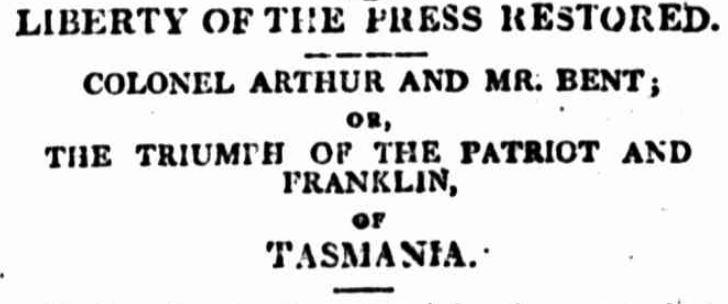
Bent appears not to have reprinted these remarks at the time, although he did later in 1836. The Sydney papers did circulate in Van Diemen’s Land, of course, but remarks from some of Bent’s newspaper rivals during the course of 1829 suggest that the term was soon being bandied around quite a bit locally. Perhaps Bent could not resist boasting in private conversation, or in the pub. Something definitely got under the skin of John Pascoe Fawkner, who had commenced the Launceston Advertiser at the beginning of 1829 with second hand equipment purchased from his old acquaintance. Fawkner of course knew all of Bent’s early history in Hobart and thought Bent and his paper had become far too cocky, and needed taking down a peg or two. Picking up on a tongue-in-cheek remark in another Launceston newspaper, the Cornwall Press, on 7 April (Thou Franklin of Tasmania, fie upon thee!) Fawkner unleashed on the ‘would-it-be-could-be’ and ‘modest’ colonial Franklin at least four times during the rest of the year.
The Hermit in Van Diemen’s Land
From June to December 1829 Bent’s Colonial Times ran a series of satirical sketches entitled ‘The Hermit in Van Diemen’s Land.’ The author, styling himself ‘Simon Stukely’, was later identified as convict Henry Savery.
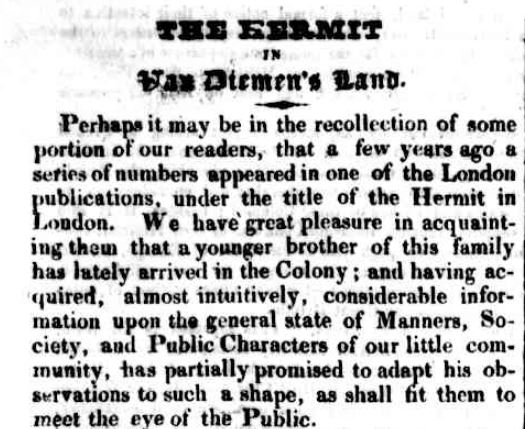
Hobart’s numerous lawyers were the chief targets of Stukely’s pungent observations, but many other local identities, from the Chief Justice and his wife down to publicans and shopkeepers, found themselves lampooned. Towards the end of the series there was a pen picture of Andrew Bent himself riding in furious pursuit of some wild cattle on his farm at the Cross Marsh. This little sketch was quite charming and certainly mild in comparison with many of the other characterizations. In what was a shameless piece of puffery (unless tongue in cheek) Stukely expressed surprise that the rider turned out to be…
the industrious, praiseworthy individual, to whom the Public are under an everlasting debt of gratitude, for laying the foundation of the press of this Colony, and for his subsequent efforts towards raising it to its present highly respectable footing, to say nothing of the benefit he has conferred upon mankind by the publication of my “peculiar” essays. Little indeed did I expect to find a mighty Nimrod, in my indefatigable friend, the “second Franklin”.
Soon afterwards this last sentence came back to bite Bent, when he was tried for libelling the Under Sheriff, Michael Kennedy. The prosecuting counsel, Solicitor-General Alfred Stephen, had himself caught the Hermit’s eye.
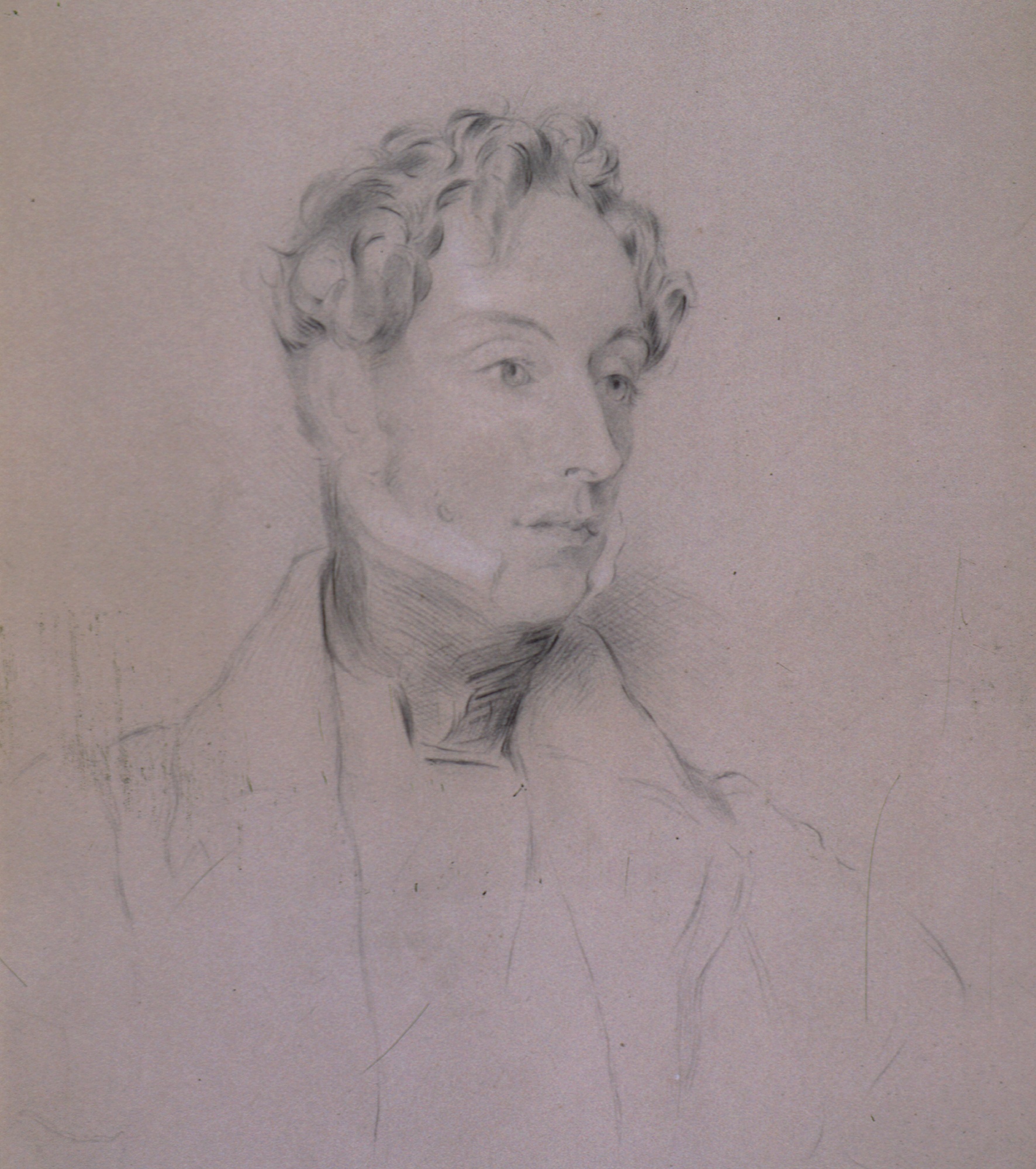
‘His consumptive and delicate appearance,’ wrote Stukely, ‘would scarcely have warranted the expectation that his physical powers were equal to the deep sonorous tones which proceeded from him, or to the exertion which he displayed’. According to the trial report in the Tasmanian newspaper, Stephen employed these sonorous tones in an address to the court which occupied ‘FOUR HOURS’ and displayed ‘the greatest zeal, talent, energy and eloquence’ or, according to the account in the Colonial Times, ‘inflammatory language’ and the ‘most violent strain of invective.’ He referred with heavy sarcasm to ‘this Nimrod of Printers, this Franklin of this hemisphere’ who had been equally boastful of his journal circulation and his own talents. The editor of the Tasmanian, R. L. Murray, who himself had a libel prosecution pending against Bent at this time, noted Stephen’s ‘happy use’ of the ‘silly comparisons’ with Nimrod and Franklin.
Bent planned to reprint the sketches as a pamphlet, but, because of another impending libel prosecution brought by solicitor Gamaliel Butler (who had received rather rough handling from the Hermit) publication was suspended at the last minute. Some copies, however, were circulated clandestinely, and a total of nine have survived.

The British Library copy, which has just recently been digitised, bears a number of significant annotations, including one by Andrew Bent himself, written sometime between June 1831 and April 1832 (so well after the trial). Bent wrote some identifications in red ink on the blank page opposite his own entry. He also underlined the words ‘second Franklin’ in the same red ink, so it seems that the fulminations of Alfred Stephen and John Pascoe Fawkner alike, were so much water off a duck’s back.
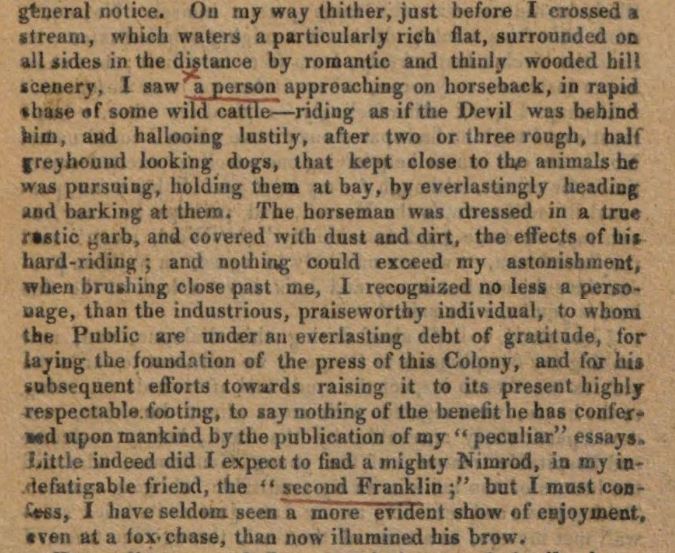
On 10 August 1831 Hall reported in his paper that ‘the Tasmanian Franklin’ had sent to England for new printing equipment and editorial assistance. This occasioned some mockery from the Colonial Times, now in the hands of Henry Melville, feeling threatened by this possible competition. Nobody in Hobart had heard about the new journal, and a grammatical blunder in the article bespoke Franklin himself as the source of it. ‘Oh dear! Oh dear! poor Franklin ! We should be glad, however, if the Monitor would favor us with information in what single point the Tasmanian and American Franklin resembled each other’. When George Clark died later in the year, the Tasmanian took the opportunity to remind everybody that Clark was the ‘real Franklin of Tasmania’ regardless of what the interloper Bent might claim.
‘OF FRANKLIN BLOOD’
In 1834, in a personal letter to Bent which he printed in the Monitor, Hall, expressing ‘the greatest esteem’ for Bent’s ‘public and private character as a Colonist’, finally explained what he meant.
In addressing you as the Tasmanian Franklin, I do not mean to say, that your labours have been crowned with success like those of that brilliant statesman and philosopher; this would be to satirize, rather than to do you honour. What I mean by giving you that honourable title, is, that you have, like the American printer, proved of Franklin blood, and that you have displayed the principles and the courage of that great Reformer; no small honour in these miserable times, and in the parts of the earth where we have the unhappiness to dwell.
Despite this high praise Hall, in comparing Bent’s situation with his own, seemed to feel it was a pity Bent threw in the towel after losing half his fortune. If he had proceeded to full martyrdom by defying the Act and being sent to a penal settlement, then the Tasmanians, who were still saddled with Arthur, might have been rid of him long since as had happened with Darling in New South Wales.
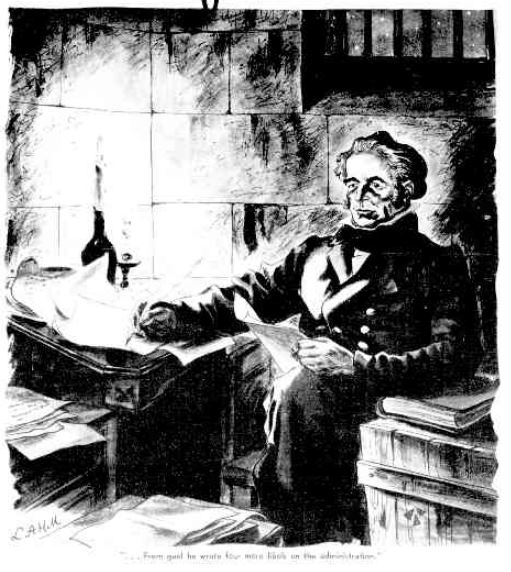
GILBERT ROBERTSON
In 1835 high praise for ‘Franklin’ also came from Bent’s fellow Hobart newspaperman Gilbert Robertson, although he subsequently changed his tune to one of withering scorn.
Bent and Robertson had both been associated with the opposition paper the Colonist from its inception in 1832, Bent as its practical printer and Robertson as its first editor until he fell out with the trustee proprietors. By the middle of 1834 Robertson had wrested control of the paper into his own hands and renamed it the True Colonist. Bent printed it for a while but soon gave Robertson his marching orders when he failed to pay up. Historian John West has remarked that Robertson’s journalistic style, ‘might [have been] heroic if inspired by truth’. In 1835 Robertson was sentenced to a hefty gaol term for libels on both Arthur and Colonial Secretary John Montagu. It was only thanks to Bent, who offered to print the paper again for free while Robertson was confined, that it was not consigned to oblivion. Bent put himself in great danger by doing this, and when the authorities tried to entrap him into selling copies of what the Attorney-General (Alfred Stephen again) described as an ‘abominable paper’, Robertson sprang to his printer’s defence. In an article headed ‘Poor Franklin again’ Robertson, as he had done when Bent first offered to print the True Colonist earlier in the year, heaped the most lavish praise on the ‘Tasmanian Franklin’ for his patriotic conduct. He could hardly do otherwise.
They fell out after Robertson was released from prison and Bent commenced his own little paper, Bent’s News. After the arrival of new governor, Sir John Franklin, the machinations of various factions led to a re-alignment of allegiances among the newspapers. Franklin’s secretary Alexander Maconochie described the local press as ‘distempered’ and ‘degraded into a mere vehicle of scandal’. By 1838, probably because its proprietor was struggling financially, Bent’s News had become a scurrilous rag in which a mischievous coterie associated with the old Arthur ‘rump’ gained influence. They attacked R. L. Murray and Alfred Stephen, both of whom later successfully prosecuted Bent for libel. Gilbert Robertson had aligned himself with the two latter gentlemen so he too was attacked in squibs which were at times vilely racist. He threatened legal action against Bent, but this was all bluster.
Robertson, always vicious when on the attack, conveniently forgot his previous high praise for ‘Franklin’ and did not mince words. Referring to Bent’s News as a ‘rascally rag’, and its proprietor as a ‘poor illiterate conceited being’, he described how he had to put up with Bent, and all the ‘ridiculous fame bestowed upon him by the Sydney papers as the Tasmanian Franklin!!!!!’ because at the time he had no other choice. ‘Some of our Sydney neighbours are most miserably mistaken’ he averred, warming to his theme.
We could go 20 miles to see the editor of the Sydney Monitor or the real editor of the Sydney Colonist … introduced to ten minutes conversation with Mr. Smith Hall’s Franklin!!! of Tasmania. How they would be astonished! Why the poor man’s character, and talents, resemble Franklin’s, just as much as Little Rowland’s [referring to lawyer Thomas Woods Rowlands who was among the group holding sway at Bent’s News] resemble Lord Brougham or Sir Matthew Hale, except that Little Rowlands can spell the English language and speak it, (only considerably mixed with flash slang) neither of which the Franklin can do, except in the lowest dialect of Cockneyshire, and he is no more capable of putting together even the vile trash [which appears in his paper] than he is to translate the inscriptions on the Pyramids. (True Colonist 11 May 1838)
While this tirade says as much about Robertson’s fickleness and propensity for exaggeration as it does about Bent’s vanity and literary limitations, it was certainly a monumental put-down. It was not the last word, though.
Robertson had calmed down by the time Bent was about to depart for Sydney with his pockets empty and his reputation in tatters. Robertson wished him well, but still could not resist prefacing some of his remarks with ‘Although Mr. Bent is not a Franklin …’
Robertson’s criticism seems to have had little effect on its target. Was this a mixture of stupidity and vanity on Bent’s part, or was it simply that he knew the hot headed Robertson all too well and declined to take too much notice of him? Either way Bent continued to use the term ‘Tasmanian Franklin’ later on in material relating to his appeal for financial assistance, and it was parroted by some of the newspapers which printed his advertisements around that time.
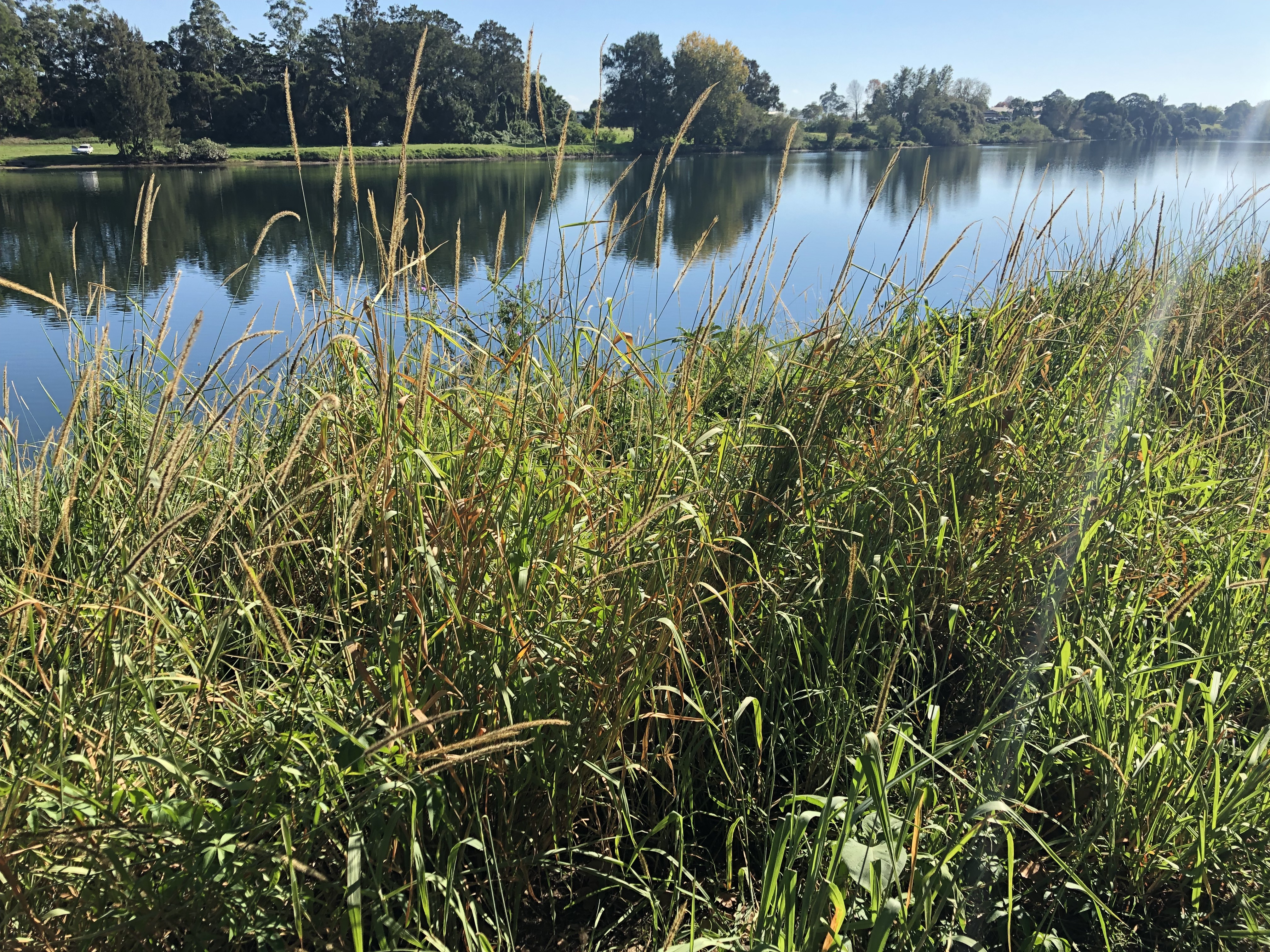
In April-May 1841 a series of letters about ‘The New Northern Colony’ appeared in the Australasian Chronicle, a newspaper Bent had printed before moving to Kempsey at the close of 1840. They were written from the McLeay River and if any further evidence is needed that the writer was Andrew Bent, it can be found in the signature FRANKLIN.



Thanks Sally – great reading
LikeLike
Dear Sally, another fascinating Andrew Bent article, thank you! Eve
>
LikeLike